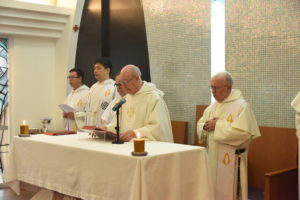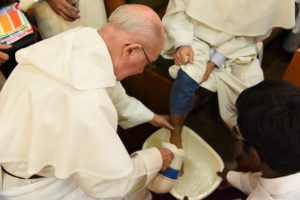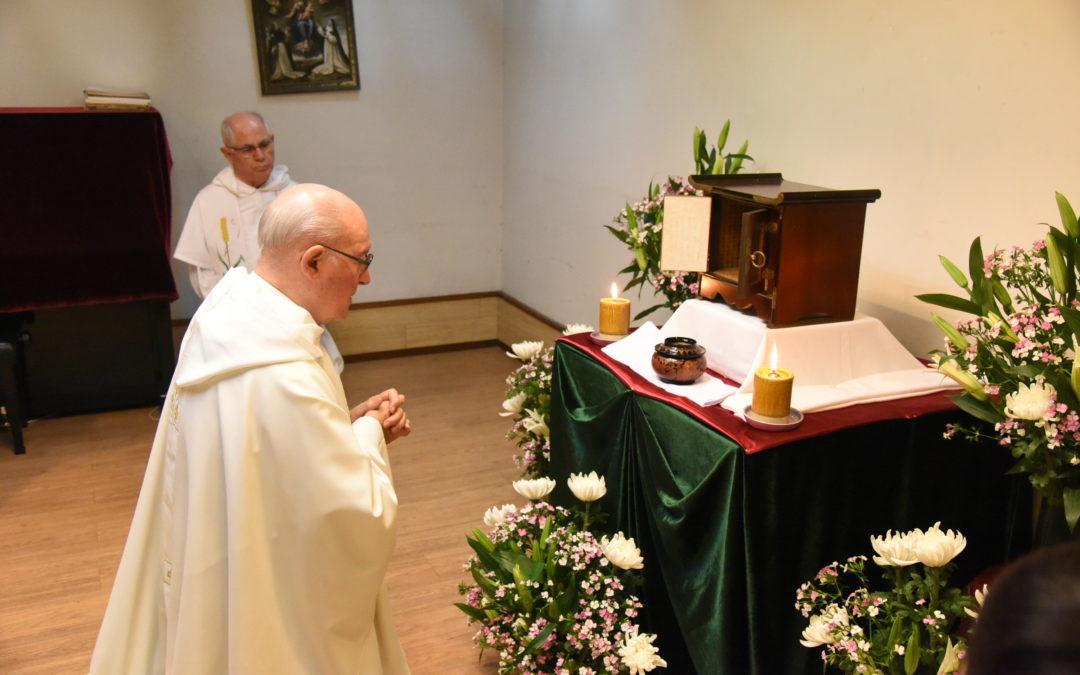-The Mass of the Lord Supper we are celebrating, plunges us into the drama of the final moments of Jesus earthly journey. You can feel the tension of this hour of which John speaks in his Gospel. It is a sobering, even frightening time when danger lurks on the horizon.
-Today gospel reading is all about love: love given, love received, love enjoined. On the solemn moment of the eve of his death, Jesus did what every human being does on the point of death: he centered on the essential.

On that night when he was going to be delivered, Jesus made an unusual gesture: he rose from the table, distancing himself from the place reserved for those who preside, and placed himself in the position of those who, then and now, belong to the category of “those who serve”, the place of one of many. The essential for Jesus was his love for all, especially those who needed Him most. From that place, that of “one of many”, he saw near and inside those whom others considered far and away and, on the other hand, those at the to turned out to be below. Because for him the most, thebiggest and the most importantwere those that in our eyes are less.
– The gesture of Jesus, washing the feet to his disciples task reserved exclusively for slaves- is the prelude of his passion and the key of interpretation: Jesus passion is essentially a service of love to the extreme: He loved his own in the world, and He loved them to the end (Jn 13, 1-15).
The washing the disciples feet symbolizes the ultimate service Jesus is about to give to them by giving up his life on the cross. It serves also as a model for how the disciples, you and I, are to love one another.
The action itself is startling, since Jesus is the Messiah and Son of God. It should be the disciples who wash Jesus feet as a sign of humility, faithfulness, and love. He reverses that process, and Peter immediately objects. His objection makes sense, and he probably was speaking for the whole group.
After Jesus has finished washing his disciples feet, he asks them directly if they realize what he has done for them. In fact, Jesus has given them a model for what it means to be one of his followers. It means to serve one another in radical forms of love. It means to wash one another feet.
Later on, Jesus will refer to this kind of love as a new commandment. It is new in that it demands radical equality among the disciples and the ones they serve. This was symbolized by Jesus when he came down from his chair, took off his robe, and tied a towel around his waist. He became one with the people he was about to serve. And what he did for them, they are, we are, to do for one another.
The Risen Christ, who shared this meal on the eve of his own passion, hosts us and serves us each time we gather to celebrate the Eucharist. As people of the Eucharist, you and I are also called to be people of the basin and towel. We are invited to emulate this Jesus through lives of loving service to others. We are called to wash the feet of one another.
Bread and wine, basin and towel. These symbols are at the very center of our identity as followers of Jesus. They represent an ongoing challenge. They are countercultural because they challenge the “Me First mentality that often prevails in our society.
One of the greatest gifts Jesus gave to us is dramatically evident in today Gospel. In the washing of feet, Jesus teaches us how to serve.
– Not satisfied with this, He still thinks on his disciples, on all of us, and institutes the Eucharist, for He wants to stay with them forever and offers himself not without a great scandal for many of his Jewish listeners, as food to eat, blood to quench their thirst of life, and as a guarantee of eternal life for those who truly believe in him.
 -Jesus institutes, besides, the Priesthood, so that they will have always somebody who, in His name, will take, bless, break and distribute this bread and wine to them, wipe out their sins, and sometimes their tears, too, and remind them that, -as St. John of the Cross said-,at the sunset of life, you will be judged on love but, above all, we should not forget, we will be judged by Love Itself.
-Jesus institutes, besides, the Priesthood, so that they will have always somebody who, in His name, will take, bless, break and distribute this bread and wine to them, wipe out their sins, and sometimes their tears, too, and remind them that, -as St. John of the Cross said-,at the sunset of life, you will be judged on love but, above all, we should not forget, we will be judged by Love Itself.
- The washing of the feet is, then: 1) a revelation; it is not a queer occurrence of the moment, or a superficiality, but the supreme teaching of Jesus. It is love made servant and slave, ready to kneel down before humanity and give up life on the cross of every day for us.
- It is also 2) a revolution: he cannot allow that any person, no matter how important she might be, lord it over the rest with injustice or strip him/her of their human dignity. The Eucharist, Jesus food and life for us, makes all of us equal in dignity, children of God.
- It is, finally, 3) a challenge: his followers must follow this example, seeking, as He did, those who are most needy, and trying to become a Good Samaritan to them.
- Do you realize, Jesus says, what I have done for you? I have given you a model to follow; so that as I have done for you, you should also do (Jn 13, 15). That is Christ final message to his followers…, and to us.
- And so, my dear sisters, brothers and friends, in this day, confronted with this challenging Gospel reading, it is worth asking ourselves:
*What have I done for Jesus and for my neighbour?
*How many feet have I washed?
*Have I tried to imitate Christ?
*What am I ready to do, starting from this very moment?

